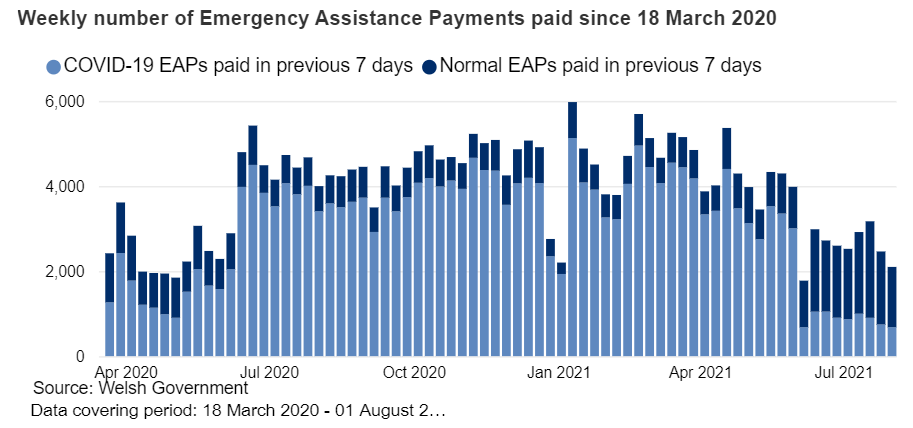 Poverty
Poverty 
Ellie Harwood and Steffan Evans take a look at the latest data on the Discretionary Assistance Fund and explore the vital role it could play this autumn.
As we move into the ‘final lap’ of emerging from the pandemic, many of the financial protections that have provided people on low incomes with a lifeline over the past 18 months have either already ended, or are in the process of being withdrawn over the coming weeks. As this vital support is taken away, there are concerns that many more people in Wales could now be pushed into poverty. The decision to cut Universal Credit by £20 a week means a third of households with children in Wales will see over £1,000 a year cut from their disposable income, just as the furlough scheme comes to an end.
By contrast, the Welsh Government has committed to continue with some vital forms of support. It has pledged to continue providing support in lieu of Free School Meals over the school holidays until spring 2022, and recently increased the support provided to self-isolating workers. There are concerns, however, that other equally important forms of assistance have started to be scaled back.
Wales started the pandemic well equipped to provide emergency cash payments to struggling households, thanks to the existence of the Discretionary Assistance Fund (DAF), Wales’ national welfare assistance scheme. There are two forms of support provided through the DAF: a small cash grant for essential living costs (EAPs), and support to allow someone to live independently (IAPs). People can access the DAF for a variety of reasons, provided they have no savings and find themselves in an emergency situation without access to any money. When the main social safety net fails, the DAF is there to catch people and prevent them from experiencing extreme destitution.
At the start of the pandemic, the Welsh Government rapidly adapted the DAF so it could better support people with the additional challenges created by lockdowns, shielding and self-isolation. By increasing the budget of the DAF, allowing more frequent payments, and introducing new flexibilities into the qualifying criteria, the Welsh Government ensured more households in Wales were able to get financial assistance when they found themselves facing exceptional hardship. In particular, the flexibility allowing families to make a claim because they faced extra costs as a result of their children being unable to attend school provided a welcome additional safety net for low-income households with children.
Since March 2020, almost 220,000 Covid-related EAPs have been made via the DAF, paying out nearly £15million to households in need. On average, people received an award of £67, allowing them to buy basic resources such as food and electricity, while preventing them from falling into deeper destitution.
However, the number of such awards made through the DAF has decreased sharply over recent weeks.

This reduction is primarily due to the Welsh Government’s decision to remove one of the main lockdown-related DAF flexibilities at the end of June 2021. From now on, people cannot usually qualify for a DAF payment if they face hardship due to extra costs incurred as a result of the pandemic. Previously, people could get help if they incurred extra costs due to, for example, the need to self-isolate or shield during the pandemic; being at home all day with children, which incurs extra fuel costs; or to meet the increased costs of shopping online for groceries, and at local convenience shops, which can be more expensive than budget supermarkets.
While the impact of this change is somewhat offset by a rise in the number of payments awarded under normal EAP criteria, the number of emergency cash payments made via the DAF has halved over recent weeks. This is despite the fact Wales was entering the third wave of the coronavirus pandemic just as this change was implemented, with over 33000 children unable to attend school due to Covid-19 outbreaks in their settings.
While the Welsh Government has committed to the ongoing provision of EAPs for some Covid-related reasons, the reduction in flexibilities comes at a potentially very challenging time for low-income households. There are still some important questions that need to be addressed ahead of a difficult autumn for people living on low incomes in Wales:
- As Universal Credit is cut by £20 a week and furlough ends, is there enough flexibility within the DAF system to enable families to receive multiple payments, if needed, through what is set to be an extremely challenging autumn?
- Will the DAF system show enough flexibility to provide assistance to those families who are squeezed by rising living costs this autumn, given the cost of food and utilities are both forecast to significantly increase?
- Will the DAF be there to support families with children who cannot attend school, if there continue to be outbreaks of Covid-19 in education settings through the rest of 2021?
- How will the Welsh Government ensure that it continues to promote and raise awareness of the DAF, so people who are pulled into poverty for the first time know they can receive cash support when they find themselves facing a financial crisis?
It is vital that the Welsh Government takes action to address each of these questions, so thousands of Welsh families are not left without an adequate safety net this autumn.
Ellie Harwood is the Wales Development Manager at the Child Poverty Action Group and Co-chair of the Wales Anti-Poverty Coalition
Steffan Evans is a Policy Research Officer at the Bevan Foundation and Co-chair of the Wales Anti-Poverty Coalition



Thanks, I’d missed this.